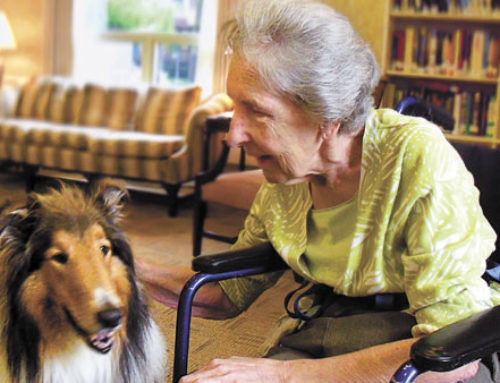Dehydration is a serious medical concern among seniors in which the body doesn’t have the amount of fluids it needs to function properly.
Dehydration often goes unnoticed by seniors and their caretakers. Older people may not feel as thirsty which can lead to not drinking as much. They may also have memory issues and forget to drink, or problems with urinary incontinence, which can make them reluctant to drink.
Do you know these four signs of dehydration in seniors?
Headaches
It’s common for people both young and old alike to suffer from headaches when the body is dehydrated. Dehydration can lead to migraine or tension headaches, although the exact reason for this is unknown.
Blood vessels in the head may constrict which can cause lack of oxygen to the brain, or the brain may temporarily shrink due to lack of water. Regardless, if your loved one is complaining of a headache, evaluate their fluid intake to consider dehydration as the cause.
Less Frequent Urination
A person who’s dehydrated may not go to the bathroom often, or when they do go, they urinate a small amount or the urine is very dark in color. Ideally, urine should be a clear or pale yellow color to prevent dehydration.
Dehydration can also cause constipation. It’s important to regulate when and how much your loved one goes to the bathroom. If they haven’t had a bowel movement or aren’t urinating as much, dehydration could be the culprit.
Low Blood Pressure
While dehydration won’t always cause a drop in blood pressure, it’s possible that your loved one’s low blood pressure is the result of dehydration. There may also be associated with symptoms such as weakness or dizziness as a result of a decrease in blood pressure.
If the person doesn’t normally have low blood pressure, it’s possible that dehydration could be causing their symptoms, especially if they have additional signs of dehydration.
Confusion
Dehydration can also cause confusion in seniors, especially those who already have issues with memory. The person may also be more irritable or appear disoriented. Older adults are less likely to recognize the fact that they’re dehydrated.
If a senior is moderately dehydrated, they may have short-term memory loss, but severe dehydration could mean impaired cognition and delirium. Dehydration can be a medical emergency and should be evaluated by your loved one’s physician.
What to Do If You Suspect Dehydration
Encourage the person to drink more, but in the meantime, schedule an appointment with their primary care provider to evaluate their symptoms. If you suspect the dehydration is severe, go to the emergency room.
Your loved one’s physician can diagnose dehydration and help you come up with a treatment plan, which may involve a set schedule for drinking water or addressing incontinence problems to help the person feel better about increasing their fluid intake.
Dehydration is a serious medical condition that should be evaluated by a doctor. Don’t hesitate to get your loved one help if you suspect dehydration is present—it could save their life!





